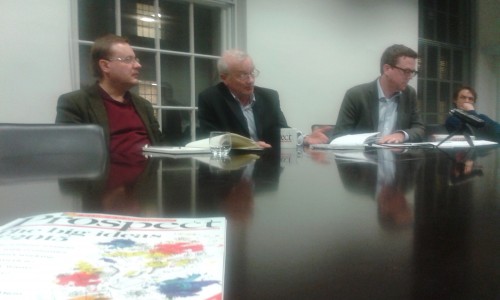
Reflecting on – Frank Close (centre) discusses the life of the Italian physicist Bruno Pontecorvo, who defected to the Soviet Union in 1950.
By Matin Durrani
Like all good publications, Prospect has a strapline about itself – “the leading magazine of ideas”. Physics World is also about ideas, although sadly our magazine, great though it is, doesn’t have adverts for Cartier watches, Embraer executive jets or the Taj Exotica Resort & Spa in the Maldives as Prospect does. Clearly, some people with ideas have more money to spend than others.
I was kindly invited last week by the deputy editor of Prospect, Jay Elwes, to an event he hosted at the magazine’s headquarters in central London. The event featured the University of Oxford physicist Frank Close, who has just published a new book on the life and times of Bruno Pontecorvo. Close was on hand to discuss the key themes of the book, which is entitled Half Life: the Divided Life of Bruno Pontecorvo. Elwes described the attendees as a “small, high-powered group”, including as it did Pauline Neville Jones, the former chair of the UK’s Joint Intelligence Committee and Jonathan Evans, the former director-general of the British security service MI5.
If you’re not aware of Pontecorvo, that’s a shame – though perhaps not surprising. A talented Italian physicist who shone as both a theorist and an experimentalist, he first worked with Enrico Fermi at Rome, where he discovered “slow” neutrons, and later with Frédéric Joliot-Curie in Paris. Pontecorvo moved to the US in 1940, where he used his nuclear nous to develop novel techniques for searching for oil, before switching three years later to Canada, where he became a member of British-Canadian efforts to build a nuclear reactor at Chalk River.
As Close described, Pontecorvo had by this time become an ardent communist and it was once he had moved, yet again, to the UK’s Atomic Energy Research Establishment in Harwell after the Second World War, that trouble really arose. You might remember some of what happened next from a recent book entitled The Pontecorvo Affair by Simone Turchetti, which we reviewed in Physics World in 2012. Suffice to say that in 1950 Pontecorvo vanished, defecting to the Soviet Union, where he was to spend the rest of his life.
Quite why he went, we’re still not sure. Close suggests that Pontecorvo “panicked” over his communist associations – indeed, he was in such a rush to leave that his wife left behind her fur coat, which is perhaps not the greatest bit of planning if you’re about to move to Moscow. Once in the Soviet Union, Pontecorvo’s career stalled due to a lack of funds and a ban on travelling overseas that remained in place until 1978. “I conjecture he didn’t realize it would be a one-way trip,” Close admits about Pontecorvo, who died in 1993.
You can find out more about what Close had to say in this audio extract of last week’s event on the Prospect website, including whether Pontecorvo was a spy – and why he thinks the Italian missed out on at least one Nobel prize, if not two. Certainly, for Close, Pontecorvo “was a physicist of front rank who made advances in both theory and experiment”.
Meanwhile, stay tuned here as we’ll be publishing our own review of Close’s book soon.
There is something fascinating about new and singular knowledge that it generally “tunnels out” from the closet through some Prometheus even in face of mortal risks. Moreover, Pontecorvo, a close collaborator of Fermi, suggested the possibility of flavour change for the three families of neutrinos via the weak interaction.